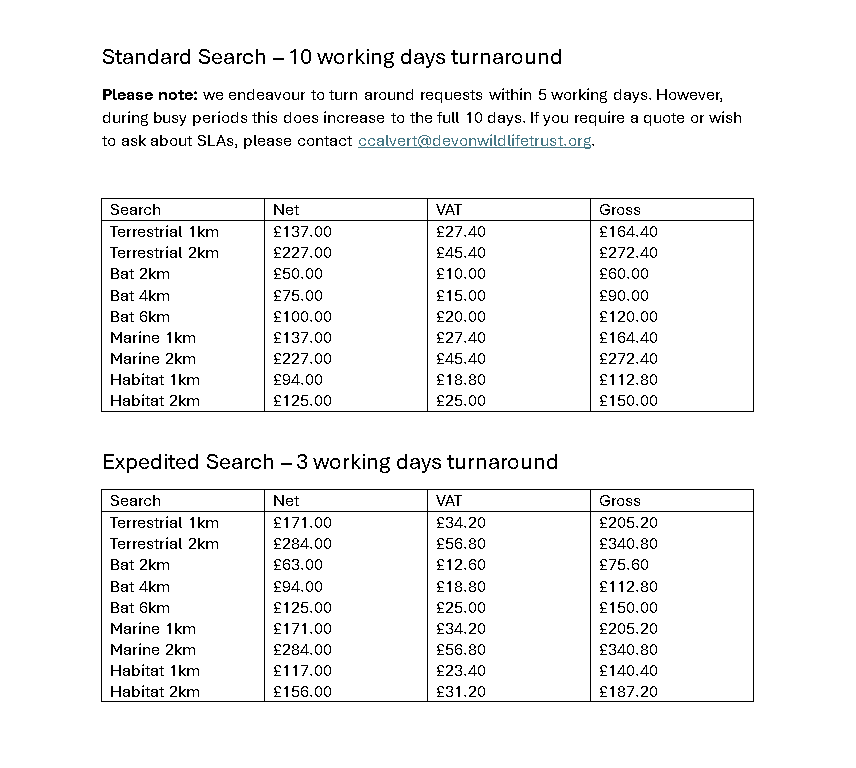Data Search
DBRC data searches provide species, site and habitat information from our databases.
Request a data search
DBRC provide a desk-based study of species records and statutory and local non-statutory sites data to inform ecological assessments and planning decisions, as well as informing communities and local conservation initiatives. This data search service has been developed to meet the needs of our clients and stakeholders. Desk-based studies are considered best practice by many organisations including CIEEM and within the British Standard BS42020.
The form has fields for the data needed to complete a data search: the location and radius of the search, the type of search, and the contact details for the data search requester. These details are required for the processing of the data search and the invoice for the works. DBRC does not sell personal data to third parties and promise to protect your personal data, in accordance with our Privacy Policy: http://www.devonwildlifetrust.org/privacy-policy.
Information is presented in an interactive HTML based electronic document. You can see an example of a data search here. If you have any queries regarding a data search please contact ccalvert@devonwildlifetrust.org.
As of April 12th 2024, there has been a slight increase in our data search prices in line with inflation. DBRC operates as a not-for-profit company and does not charge for the actual data or information. However, we do charge an administration fee to cover the cost of collating, managing, maintaining, and disseminating the biodiversity data. These costs include staff time and the overheads associated with running DBRC.
How long does a data search take?
A standard data search around a single point is generally completed within 10 business days of ordering. If ordering a data search around a polygon, there may be some additional time needed to assess the coverage of the requested area as exceptionally large search may incur additional costs.
A data search can be expedited to be completed within 1-3 business days. However this incurs a 25% additional charge on the standard rate.
How much does a data search cost?

What is in a data search?
Standard data searches can broadly be separated into four types: Terrestrial, Bat, Marine, and Habitat data searches.
- A terrestrial (also referred to as a standard) data search includes statutory and non-statutory sites and legally protected and notable species records around a small site or central grid reference.
- Bat species records are included in the terrestrial data search but you may require bats over a larger area, roost data or want just bat species in your data search. A bat data search will bring up detailed bat species records we hold within your specified area including abundances and roost data. These include records from Natural England, consultants and incidental records. Please note we do not hold records for Devon bat group. To access their records you will need to contact them directly.
- A standard marine data search includes mega-fauna sightings, notable species and marine habitats including sabellaria reefs and seagrass beds.
- A habitat data search will include BAP habitats and Strategic Nature Areas.
As noted in the above table of costs, these searches are available in several different search sizes. Our datasets are collated from multiple data sources – both our own records and data submitted by volunteers and consultants. Submitted data is the lifeblood of DBRC, if you have biological records that you would like to submit for use in our data searches, you can use our online records submission template available in the sidebar, or email your records to eknott@devonwildlifetrust.org. The more records DBRC holds, the more valuable our data searches are for protecting Devon’s wildlife.
FAQ
- Why would I want a data search?
- Data searches are designed to inform ecological assessments and planning decisions, as well as informing communities and local conservation initiatives. Desk-based studies are considered best practice by many organisations including CIEEM and within the British Standard BS42020. Data searches are frequently required as a part of planning applications.
- Why do you charge for data?
- DBRC operates as a not-for-profit company and does not charge for the actual data or information. However, we do charge an administration fee to cover the cost of collating, managing, maintaining, and disseminating the biodiversity data. These costs include staff time and the overheads associated with running DBRC.
- My company has a service level agreement with DBRC, how do I use it for a data search?
- If you are using SLA time for a data search, please contact Marcus Windle at mwindle@devonwildlifetrust.org with details of your search.
- My data search is on the county boundary. What happens to my data search?
- If your data search is on a county boundary, you may need to order an additional data search in the neighbouring county as records are not shared between record centres. In cases where a data search is on a county boundary, the search will generally be discounted to compensate for the reduced area.
- How do I pay for data?
- After ordering a data search, an invoice will be sent to the email address used to order the data search. If you are a new customer, there may be a slight delay in invoicing while your details are added to our invoicing system. If you are ordering on behalf of a company and require a PO number on the invoice, please include the PO number in the order or in a separate email after ordering.